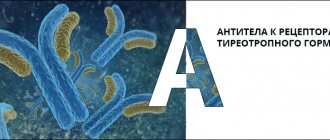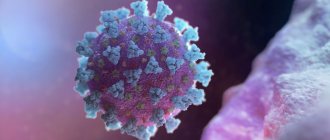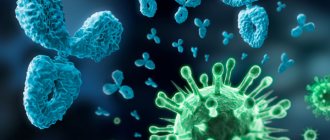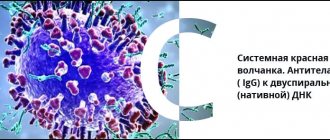Detailed description of the study
Antibodies to hCG - immunoglobulins IgG and IgM. They damage the cells of the embryo and prevent the molecules of human chorionic gonadotropin hormone from contacting the receptors of the corpus luteum.
Human chorionic gonadotropin (hCG) is a special hormone produced by placental cells during pregnancy and consisting of two subunits, nonspecific α and specific β. If the α-subunit of hCG is completely identical in structure to the α-subunits of luteinizing, follicle-stimulating and thyroid-stimulating hormones of the pituitary gland, which are constantly present in the female body, then β-hCG is unique in its structure. In this case, only β-hCG is important for assessing the course of pregnancy. The hormone is synthesized in the germ layer, a small part is secreted by the pituitary gland. β-hCG maintains the activity of the corpus luteum, beginning to act 6–8 days after ovulation, and reduces the immune activity of the mother’s body, preventing rejection of the embryo as a homotransplant. The maximum concentration of the hormone occurs in the 10–11th week of pregnancy, then its level gradually decreases.
Antibodies to hCG - immunoglobulins of the IgG and IgM classes - damage the cells of the embryo and prevent the hormone molecules from contacting the receptors of the corpus luteum. They also block the activity of hCG with a decrease in the synthesis of hormones of the fetoplacental complex - placental lactogen, estradiol, progesterone, which creates the threat of spontaneous abortion. The presence of antibodies to hCG can be an autoimmune factor in recurrent miscarriage and the cause of infertility.
New Study: Antibodies to HCG
Now LabStory can please its patients with a new study - the determination of antibodies to hCG.
Let's figure out why such research is needed.
Antibodies to hCG - what does the analysis show?
Testing for antibodies to hCG plays an important role in prenatal screening for fetal pathologies, as it allows early detection of changes in chromosome structure.
A blood test for antibodies to hCG also allows you to assess the risk of developing spontaneous abortion and clarify the cause of the development of recurrent miscarriage, in cases where spontaneous abortions are associated with anti-hCG syndrome (anti-hCG syndrome is a specific autoimmune reaction of the body, manifested by the appearance of antibodies to hCG ).
Antibodies to hCG appear as a result of immune disorders. Normally, these antibodies can be detected in minimal quantities, but when they increase above the threshold value, antibodies to hCG begin to :
- actively damage placental tissue;
- disrupt the development of the corpus luteum;
- slow down the normal development of the embryo;
- contribute to the formation of placental insufficiency
- disrupt the full functioning of human chorionic gonadotropins (HCG, hCG);
- reduce the synthesis of hormones such as estriol and progesterone;
- increase the risk of developing DIC (disturbances in the blood coagulation system);
- lead to fading of pregnancy or development of miscarriages.
However, despite the fact that antibodies to hCG can lead to spontaneous abortions, infertility, etc. their identification is not a death sentence. With timely treatment of elevated antibodies to hCG during pregnancy, it is often possible to prevent the development of spontaneous abortion.
The most effective method of reducing the level of antibodies to hCG is plasmapheresis. The essence of this procedure is to remove plasma from the patient’s blood and then replace it with saline solutions, albumin or donor plasma.
When and why is an anti-hCG test prescribed?
Indications for the study are the presence of infertility , recurrent miscarriage or the risk of spontaneous abortion . Also, the study is required to be carried out during preparation for the IVF procedure .
Detection of an increased amount of antibodies to hCG is observed at risk of:
- fading pregnancy;
- miscarriage.
How to donate blood for AT to hCG?
Blood for research is donated in the morning, on an empty stomach. It is allowed to drink non-carbonated water.
The day before the test, you should avoid physical and emotional stress, overeating, and drinking alcohol. In the morning before blood sampling, you should refrain from smoking.
Can a blood test for hCG be “wrong” in determining pregnancy?
The probability of error is extremely low.
If the analysis is done too early, the result may be false negative: despite conception having occurred, the concentration of hCG in the blood has not yet reached significant values.
A false positive result means that the test showed pregnancy when in fact it was not present. In fact, the analysis showed not pregnancy, but the presence of hCG in the blood, which can be explained by certain diseases (primarily tumor processes) or taking drugs containing hCG (for example, in the treatment of infertility).
Why do you need a blood test for hCG during pregnancy? When (at what time) should it be taken?
rainbow.1
HCG is human chorionic gonadotropin, it produces chorionic cells. The chorion is the membrane of the embryo and the cells of the hypothalamus. Human chorionic gonadotropin is a hormone that is vital for the regulation and preservation of the physiological course of the entire pregnancy in women. It regulates the secretory activity of the hCG corpus luteum, is also involved in the secretion of progesterone, and stimulates the processes of embryo implantation, while preventing the female body from rejecting the developing embryo. If there is insufficient quantity, the fetus may be rejected by the female body.
According to its chemical structure, human chorionic gonadotropin is a glycoprotein; it consists of two subunits. The α-subunit of hCG is completely homologous to the α-subunits of luteinizing, thyroid-stimulating and follicle-stimulating hormone. Human chorionic gonadotropin plays an important role in maintaining functional activity and in the development of the placenta itself, because it is the most important thing for the unborn child. HCG improves its trophism and also helps to increase the number of chorionic villi. Patients sometimes, but not often, have an increased level of antibodies to human chorionic gonadotropin in the blood serum; this phenomenon is called anti-hCG - a syndrome when antibodies to hCG are not produced.
The reasons for this are not always clear and poorly understood, but one of the important factors of anti-hCG syndrome is intracellular or viral bacterial infections (such as mycoplasmosis, chlamydia and many others). Also, in patients with this anti-hCG syndrome, hormonal disorders are often detected. Creates a functional deficiency of such a hormone and antibodies to hCG. But it is necessary to distinguish between true anti-hCG syndrome and a temporary or also called transient increase in antibodies to hCG, which is observed with different variations of polyclonal activation of the immune system. With polyclonal immunoactivation, the elimination of excess production of anti-hCG antibodies should be aimed at treating foci of chronic inflammation.
But the treatment of true anti-hCG syndrome is much more difficult due to insufficient information about what causes it. To identify antibody markers of this anti-hCG syndrome, the Anti-hCG Test method is used. This method makes it possible to combine true anti-hCG syndrome and its polyclonal immunoactivation. Everything happens due to the fact that antibodies to hCG and collagen, the main protein of connective tissue, are simultaneously detected.
If there is a selective increase in test serum reactivity with hCG, while levels of collagen and DNA immunoreactivity remain low, then this indicates that the woman being tested has true anti-hCG syndrome. Antibodies to hCG can lead to miscarriage, so you must follow your doctor’s recommendations and, if necessary, undergo an appropriate course of treatment.
The hCG blood test is used not only to determine pregnancy
During the normal course of pregnancy, the presence of hCG in the blood follows a certain pattern. At the beginning of pregnancy, the level of hCG increases rapidly: starting from the 3rd week, it doubles every 2-3 days. By the 11-12th week, growth slows down. Then there is a period of decrease in the level of hCG in the blood - from approximately the 12th to the 22nd week. After which the hCG level begins to rise again, but at a slower pace.
The range of reference values for the level of hCG in the blood is quite large, so it is usually difficult to draw conclusions about the course of pregnancy from one analysis: everything is too individual. However, a series of consistent analyzes will show whether your situation fits into the scheme described above or not.
Interpretation of the results of a blood test for hCG
HCG is below normal
If the hCG level is below normal (or expectations), then this may indicate such dangerous pathologies as:
- ectopic pregnancy;
- frozen pregnancy (the fetus has stopped developing);
- risk of miscarriage;
- delay in fetal development;
- impaired development of the placenta;
- in the second and third trimesters, a decrease in hCG levels may be a consequence of fetal death.
If you receive a result that goes beyond the reference values, you should not be immediately alarmed. Perhaps you simply misjudged how far along you are in your pregnancy. In any case, the doctor will prescribe a repeat analysis and additional studies (in particular, ultrasound); A diagnosis cannot be made based on one analysis.
HCG is higher than normal
If the test shows a level of hCG in the blood that is higher than normal, this may indicate:
- multiple pregnancy (in this case, the hCG content will increase in proportion to the number of fetuses);
- diabetes;
- fetal pathology (including Down syndrome);
- toxicosis.
Anti-hCG
Human chorionic gonadotropin (hCG) is a complex protein molecule (dimer) that is a specific pregnancy hormone. The hCG molecule contains two subunits - alpha and beta. Subunits identical to the alpha subunit of hCG also have pituitary hormones: thyroid-stimulating hormone (TSH), luteinizing hormone (LH), follicle-stimulating hormone (FSH). The structure of the beta subunit (β-hCG), which is a sequence of 145 amino acids, is 80% similar to the structure of the beta subunit of luteinizing hormone. However, it is 20% unique and performs biological functions unique to it.
Human chorionic gonadotropin is produced by trophoblast cells - the outer surface membrane covering the embryo, due to the growth of which the embryo attaches to the wall of the uterus. It is secreted in small quantities in the pituitary gland. The overwhelming amount of hCG circulating in the blood is utilized by liver cells, from where about 20% of the hormone is excreted in the urine.
HCG is detected in the female body 5-6 days after conception. After fertilization, its concentration increases so much that after 6-8 days it is possible to determine the presence of pregnancy in the blood serum, and after another 1-2 days - by the content of β-hCG in the urine (a quick test strip is based on this, allowing for primary diagnosis at home ). HCG is produced by the body throughout pregnancy. The second to fifth weeks of normal pregnancy are characterized by a twofold increase in the amount of the hormone every one and a half days. Its level directly depends on the number of fruits - the hCG content increases in proportion to it. The highest concentration is observed at 10-11 weeks, after which the levels gradually decrease.
In the first three months of pregnancy, hCG, acting on the corpus luteum, activates the production of progesterone and estrogens (female sex hormones) - they support pregnancy. The effect of hCG on the corpus luteum is similar to the effect of luteinizing hormone, whose task is to ensure its viability. This “patronage” lasts until the moment when the placenta, formed from the maturing and growing chorionic tissue, is fully formed (up to 16 weeks) and the fetus in combination with the placenta begins to produce the necessary hormones themselves.
In addition, hCG:
- has a stimulating effect on the ovarian synthesis of weak androgens and estrogens;
- helps to increase the functionality of the chorion;
- stimulates the normal functioning of the placenta.
The normal course of pregnancy, starting from 8-10 weeks, depends on the hormonal activity of the placenta. At the same time, the action of hCG prevents fetal rejection by reducing the activity of the mother’s immune system.
A male fetus, under the influence of hCG, which stimulates Leiding cells, begins to produce testosterone, a male sex hormone that affects the formation of male genital organs.
In the male body, hCG is a stimulating factor in the production of testosterone by the testicles.
The appearance of antibodies to human chorionic gonadotropin is autoimmune in nature (i.e., it is caused by a malfunction of the body’s immune system). They block the activity of hCG, which results in a decrease in the production of a number of hormones by the fetoplacental complex, including placental lactogen, progesterone, and estradiol. Having a negative impact on the functioning of the complex, antibodies cause the development of disseminated intravascular coagulation syndrome (DIC - a condition in which increased platelet aggregation occurs and the consumption of blood coagulation factors increases, which, with slow development, causes venous thrombosis, and with rapid development, bleeding). The presence of the syndrome is a signal of the threat of early miscarriage or death of the child at 4-9 months of pregnancy. DIC syndrome can become chronic, which leads to thickening of the blood, the formation of multiple thromboses in the placental vessels and, as a consequence, fetoplacental insufficiency and placental abruption. Damage to the placenta makes it unable to retain toxins. The entry of toxic substances into the bloodstream of a developing child becomes the cause of his intrauterine death.




